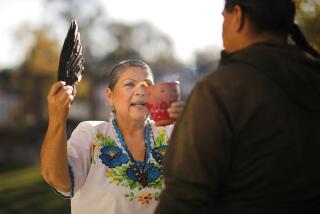Prayer for healing works at close range
- Share via
Can prayer boost the odds of recovery from physical ailments? Studies on the question have yielded no clear-cut answers, although one well-known, 2006 study of people who prayed for others from long distances concluded that prayer had no effect on healing. A new study, however, found dramatic healing effects for people who were prayed over by someone in close physical proximity and who believed that this kind of prayer could heal them.
This type of prayer, which often includes the healer laying hands on the patient, is practiced by some Pentecostal Christian groups. Religious studies researchers from Indiana University in Bloomington tested the practice, called “proximal intercessory prayer,” on 25 people in rural Mozambique where this type of healing is embraced. Fourteen of the people had hearing impairment and 11 had vision impairments. The participants’ hearing or vision capabilities were assessed with simple vision charts or hearing machines before and after prayer. The subjects improved significantly after the prayer in increments that are beyond what would be expected from a placebo response or the mere suggestion that they were going to be healed.
The study has many drawbacks, the authors point out. The measuring devices were fairly crude and the subjects could not be reached even one day later to conduct follow-up testing to see if the effect endured. The study was not randomized, placebo-controlled or blinded -- all characteristics of a rigorous scientific review. Nevertheless, the authors concluded that brief, proximal intercessory prayer should be explored further as a potential therapy, particularly for populations in which convention medical care is unavailable.
“If empirical research continues to indicate that [proximal intercessory prayer] may be therapeutically beneficial then -- whether or not the mechanisms are adequately understood -- there are ethical and nonpartisan public policy reasons to encourage further related research,” the lead author of the study, Candy Gunther Brown, said in a news release.
An editorial accompanying the study, released online Wednesday in the Southern Medical Journal, concurred. Dr. John R. Peteet, a psychiatrist at Brigham and Women’s Hospital in Boston, notes that the authors of the study aren’t asking readers to consider a supernatural explanation for the findings “...but their report challenges the world view of readers who rule out the supernatural, or relegate it to another time,” he wrote.
-- Shari Roan






